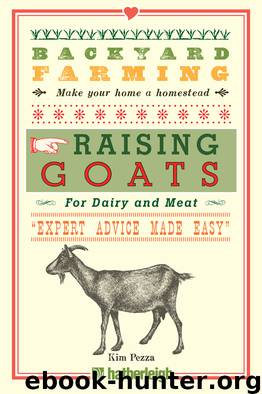Raising Goats: For Dairy and Meat by Kim Pezza

Author:Kim Pezza [Pezza, Kim]
Language: eng
Format: epub
ISBN: 978-1-57826-474-2
Publisher: Hatherleigh Press
Published: 2013-11-25T16:00:00+00:00
It is important that your kids receive the colostrum they need to stay healthy; if they can’t get it from their mothers, they will need you to provide it.
For the first three weeks, the kids should be fed at least four times per day. Starting at week three, you should also begin to slowly introduce solids into their diet as well. At week four, bottle feeding can be cut to three times a day, with free choice of a 14 to 16 percent protein feed. Starting the kids on solids will begin the stimulation of rumen (first stomach) development.
One thing that you need to watch for in kids being fed milk replacement is bloat; especially if the replacement contains soy (bloat will be covered further in Chapter 11). For this reason (and others), it is a good idea to make all food changes gradually.
Bottle-fed goats may be weaned at eight weeks, as long as they are eating their hay and grain properly. Kids that are feeding directly from their mother (meat-breed kids) may be weaned at any time from eight weeks on, after which you should monitor their body condition and food intake. Some goat owners will wait a little longer before they wean the kids of meat goats.
When you wean a kid from its mother, you may hear a lot of bleating and crying, especially from the kid, but at times from the mother as well. Weaning can be a stressful time for the kids, so you will need to watch for weaning shock. With weaning shock, kids (with males being more susceptible) can slow or even stop their growth. They may also lose weight. To minimize the problem, just be sure that the kid is the proper weight for the particular breed before weaning; the healthier the kid, the less the risk of and impact from the shock.
Although bottle feeding does take some time, it can be a necessity under various circumstances. But beyond that, it does allow you to spend time with and learn about the kids and bond with them if they are to stay with your herd. If done properly, you will have just as healthy a kid as if it nursed from the doe.
Download
This site does not store any files on its server. We only index and link to content provided by other sites. Please contact the content providers to delete copyright contents if any and email us, we'll remove relevant links or contents immediately.
Craft Beer for the Homebrewer by Michael Agnew(18237)
Marijuana Grower's Handbook by Ed Rosenthal(3677)
Barkskins by Annie Proulx(3368)
Project Animal Farm: An Accidental Journey into the Secret World of Farming and the Truth About Our Food by Sonia Faruqi(3218)
Red Famine: Stalin's War on Ukraine by Anne Applebaum(2929)
The Plant Messiah by Carlos Magdalena(2927)
0041152001443424520 .pdf by Unknown(2844)
Organic Mushroom Farming and Mycoremediation by Tradd Cotter(2689)
In the Woods by Tana French(2590)
Beer is proof God loves us by Charles W. Bamforth(2453)
7-14 Days by Noah Waters(2412)
Between Two Fires by Christopher Buehlman(2322)
Borders by unknow(2304)
Reservoir 13 by Jon McGregor(2300)
Meathooked by Marta Zaraska(2257)
The Art of Making Gelato by Morgan Morano(2254)
Birds, Beasts and Relatives by Gerald Durrell(2218)
The 7 Habits of Highly Effective People: Powerful Lessons in Personal Change (25th Anniversary Edition) by Covey Stephen R(2197)
The Lean Farm Guide to Growing Vegetables: More In-Depth Lean Techniques for Efficient Organic Production by Ben Hartman(2135)
